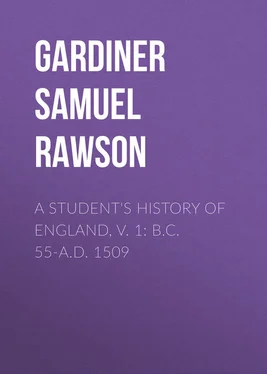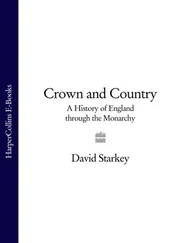Samuel Gardiner - A Student's History of England, v. 1 - B.C. 55-A.D. 1509
Здесь есть возможность читать онлайн «Samuel Gardiner - A Student's History of England, v. 1 - B.C. 55-A.D. 1509» — ознакомительный отрывок электронной книги совершенно бесплатно, а после прочтения отрывка купить полную версию. В некоторых случаях можно слушать аудио, скачать через торрент в формате fb2 и присутствует краткое содержание. Издательство: Иностранный паблик, Жанр: foreign_prose, История, foreign_antique, на английском языке. Описание произведения, (предисловие) а так же отзывы посетителей доступны на портале библиотеки ЛибКат.
- Название:A Student's History of England, v. 1: B.C. 55-A.D. 1509
- Автор:
- Издательство:Иностранный паблик
- Жанр:
- Год:неизвестен
- ISBN:нет данных
- Рейтинг книги:5 / 5. Голосов: 1
-
Избранное:Добавить в избранное
- Отзывы:
-
Ваша оценка:
- 100
- 1
- 2
- 3
- 4
- 5
A Student's History of England, v. 1: B.C. 55-A.D. 1509: краткое содержание, описание и аннотация
Предлагаем к чтению аннотацию, описание, краткое содержание или предисловие (зависит от того, что написал сам автор книги «A Student's History of England, v. 1: B.C. 55-A.D. 1509»). Если вы не нашли необходимую информацию о книге — напишите в комментариях, мы постараемся отыскать её.
A Student's History of England, v. 1: B.C. 55-A.D. 1509 — читать онлайн ознакомительный отрывок
Ниже представлен текст книги, разбитый по страницам. Система сохранения места последней прочитанной страницы, позволяет с удобством читать онлайн бесплатно книгу «A Student's History of England, v. 1: B.C. 55-A.D. 1509», без необходимости каждый раз заново искать на чём Вы остановились. Поставьте закладку, и сможете в любой момент перейти на страницу, на которой закончили чтение.
Интервал:
Закладка:
9. Eadward the Elder. 899—925.—In 899Ælfred died. He had already fortified London as an outpost against the Danes, and he left to his son, Eadward, a small but strong and consolidated kingdom. The Danes on the other side of the frontier were not united. Guthrum's kingdom stretched over the old Essex and East Anglia, as well as over the south-eastern part of the old Mercia. The land from the Humber to the Nen was under the rule of Danes settled in the towns known to the English as the Five boroughs of Derby, Leicester, Lincoln, Stamford, and Nottingham. In the old Deira or modern Yorkshire was a separate Danish kingdom. Danes, in short, settled wherever we now find the place-names, such as Derby and Whitby, ending in the Danish termination 'by' instead of in the English terminations 'ton' or 'ham,' as in Luton and Chippenham. Yet even in these parts the bulk of the population was usually English, and the English population would everywhere welcome an English conqueror. A century earlier a Mercian or a North-humbrian had preferred independence to submission to a West Saxon king. They now preferred a West Saxon king to a Danish master, especially as the old royal houses were extinct, and there was no one but the West Saxon king to lead them against the Danes.
10. Eadward's Conquests.—Eadward was not, like his father, a legislator or a scholar, but he was a great warrior. In a series of campaigns he subdued the Danish parts of England as far north as the Humber. He was aided by his brother-in-law, Æthelred, and after Æthelred's death by his own sister, Æthelred's widow, Æthelflæd, the Lady of the Mercians, one of the few warrior-women of the world. Step by step the brother and sister won their way, not contenting themselves with victories in the open country, but securing each district as they advanced by the erection of 'burhs' or fortifications. Some of these 'burhs' were placed in desolate Roman strongholds, such as Chester. Others were raised, like that of Warwick, on the mounds piled up in past times by a still earlier race. Others again, like that of Stafford, were placed where no fortress had been before. Towns, small at first, grew up in and around the 'burhs,' and were guarded by the courage of the townsmen themselves. Eadward, after his sister's death, took into his own hands the government of Mercia, and from that time all southern and central England was united under him. In 922the Welsh kings acknowledged his supremacy.
11. Eadward and the Scots.—Tradition assigns to Eadward a wider rule shortly before his death. In the middle of the ninth century the Picts and the intruding Scots (see p. 42) had been amalgamated under Keneth MacAlpin, the king of the Scots, and the new kingdom had since been welded together, just as Mercia and Wessex were being welded together by the attacks of the Danes. It is said that in 925the king of the Scots, together with other northern rulers, chose Eadward 'to father and lord.' Probably this statement only covers some act of alliance formed by the English king with the king of Scots and other lesser rulers. Nothing was more natural than that the Scottish king, Constantine, should wish to obtain the support of Eadward against his enemies; and it was also natural that if Eadward agreed to support him, he would require some acknowledgment of the superiority of the English king; but what was the precise form of the acknowledgment must remain uncertain. In 925Eadward died.
12. Æthelstan. 925—940.—Three sons of Eadward reigned in succession. The eldest, of illegitimate birth, was Æthelstan. Sihtric, the Danish king at York, owned him as over-lord, and on Sihtric's death in 926, Æthelstan took Danish North-humberland under his direct rule. The Welsh kings were reduced to make a fuller acknowledgment of his supremacy than they had made to his father. He drove the Welsh out of the half of Exeter which had been left to them, and confined them to the modern Cornwall beyond the Tamar. Great rulers on the Continent sought his alliance. The empire of Charles the Great had broken up. One of Æthelstan's sisters was given to Charles the Simple, the king of the Western Franks; another to Hugh the Great, Duke of the French and lord of Paris, who, though nominally the vassal of the king, was equal in power to his lord, and whose son was afterwards the first king of modern France. A third sister was given to Otto, the son of Henry, the king of the Eastern Franks, from whom, in due time, sprang a new line of Emperors. Æthelstan's greatness drew upon him the jealousy of the king of the Scots and of all the northern kings. In 937he defeated them all in a great battle at Brunanburh, of which the site is unknown. His victory was celebrated in a splendid war-song.
13. Eadmund (940-946) and Eadred (946-955).—Æthelstan died in 940. He was succeeded by his young brother, Eadmund, who had fought bravely at Brunanburh. Eadmund had to meet a general rising of the Danes of Mercia as well as of those of the north. After he had suppressed the rising he showed himself to be a great statesman as well as a great warrior. The relations between the king of the English and the king of the Scots had for some time been very uncertain. Little is definitely known about them but it looks as if they joined the English whenever they were afraid of the Danes, and joined the Danes whenever they were afraid of the English. Eadmund took an opportunity of making it to be the interest of the Scottish king permanently to join the English. The southern part of the kingdom of Strathclyde had for some time been under the English kings. In 945Eadmund overran the remainder, but gave it to Malcolm on condition that he should be his fellow-worker by sea and land. The king of Scots thus entered into a position of dependent alliance towards Eadmund. A great step was thus taken in the direction in which the inhabitants of Britain afterwards walked. The dominant powers in the island were to be English and Scots, not English and Danes. Eadmund thought it worth while to conciliate the Scottish Celts rather than to endeavour to conquer them. The result of Eadmund's statesmanship was soon made manifest. He himself did not live to gather its fruits. In 946an outlaw who had taken his seat at a feast in his hall slew him as he was attempting to drag him out by the hair. The next king, Eadred, the last of Eadward's sons, though sickly, had all the spirit of his race. He had another sharp struggle with the Danes, but in 954he made himself their master. North-humberland was now thoroughly amalgamated with the English kingdom, and was to be governed by an Englishman, Oswulf, with the title of Earl, an old Danish title equivalent to the English Ealdorman, having nothing to do, except philologically, with the old English word Eorl.
14. Danes and English.—In 955Eadred died, having completed the work which Ælfred had begun, and which had been carried on by his son and his three grandsons. England, from the Forth to the Channel, was under one ruler. Even the contrast between Englishmen and Danes was soon, for the most part, wiped out. They were both of the same Teutonic stock, and therefore their languages were akin to one another and their institutions very similar. The Danes of the north were for some time fiercer and less easily controlled than the English of the south, but there was little national distinction between them, and what little there was gradually passed away.
15. Eadwig. 955—959.—Eadred was succeeded by Eadwig, the eldest son of his brother Eadmund. Eadwig was hardly more than fifteen years old, and it would be difficult for a boy to keep order amongst the great ealdormen and earls. At his coronation feast he gave deep offence by leaving his place to amuse himself with a young kinswoman, Ælfgifu, in her mother's room, whence he was followed and dragged back by two ecclesiastics, one of whom was Dunstan, Abbot of Glastonbury.
Читать дальшеИнтервал:
Закладка:
Похожие книги на «A Student's History of England, v. 1: B.C. 55-A.D. 1509»
Представляем Вашему вниманию похожие книги на «A Student's History of England, v. 1: B.C. 55-A.D. 1509» списком для выбора. Мы отобрали схожую по названию и смыслу литературу в надежде предоставить читателям больше вариантов отыскать новые, интересные, ещё непрочитанные произведения.
Обсуждение, отзывы о книге «A Student's History of England, v. 1: B.C. 55-A.D. 1509» и просто собственные мнения читателей. Оставьте ваши комментарии, напишите, что Вы думаете о произведении, его смысле или главных героях. Укажите что конкретно понравилось, а что нет, и почему Вы так считаете.












